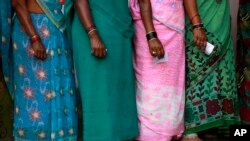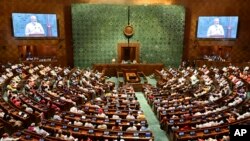More than a quarter century after a proposal to give greater representation to women in the lower house of India’s parliament, the world’s largest democracy is on course to bolster the number of female lawmakers. They will still have to wait for several years, though, before playing a more prominent political role in a country with a low position in global rankings in gender parity in legislatures.
Both houses of the parliament have passed a bill reserving one third of seats in the lower house, the Lok Sabha, and state legislative assemblies for women. The quota will not apply to the upper house, the Rajya Sabha.
All 215 members present in the Rajya Sabha supported the bill while 454 members of the Lok Sabha voted in favor and two voted against it.
The bill’s enactment is being hailed as “historic” in a country where attempts by successive governments to pass the law since 1996 had failed, largely because of regional parties’ opposition.
However, the reservation for women will only come into effect after India first conducts a census and then redraws the boundaries of parliamentary constituencies. No date has yet been announced for conducting the census that was to be held in 2021 but was delayed because of the COVID-19 pandemic.
Despite the delay, women with political ambitions, such as Dolly Verma, a village council head in the eastern Bihar state, welcomed the bill’s passage, saying women need support to participate in the political process.
"Although the timeline is not certain, it will give me more opportunity and open doors for me to become a member of a state legislative assembly or of parliament after a few years. It is a huge step for women like me who want to grow in politics," she told VOA.
The earliest women can hope for the affirmative action to be implemented will be the 2029 elections. That means India’s next parliament, for which elections are to be held next year, could still be male-dominated.
Women presently hold about 13% of parliamentary seats and about 10% of the seats in state legislatures.
The women’s reservation bill took center stage at a five-day special session of the parliament convened by Prime Minister Narendra Modi’s government this week.
Modi called its passage a "defining moment." He said it would take forward his government’s "resolve of women-led development."
Political analysts said that the long-pending bill was introduced ahead of next year’s elections with an eye on female voters, who make up more than half the electorate. Modi has implemented several programs aimed at women, such as installing toilets in village homes and providing free cooking gas connections.
Modi’s ruling Bharatiya Janata Party "hopes this measure will yield electoral dividends, but it is doubtful whether that will happen because it has no impact on next year’s polls. Voters want to see immediate benefits," political analyst Rasheed Kidwai told VOA.
While opposition parties supported the measure, they attacked the delay in its implementation calling it a "postdated check."
Saying that this is an injustice to women, Congress Party leader Sonia Gandhi asked, "How many years will they have to wait, two, four, eight? Is this right?"
"It is not historic as it is being touted, it is a sham," Mohua Moitra, a lawmaker from West Bengal, said. "Give us this day our equal rights."
India has had some powerful female politicians, such as Indira Gandhi, who served as the country’s prime minister for 17 years between 1966 and 1984. The country’s president, Droupadi Murmu, is the second woman to hold the largely ceremonial top position. Several women have been chief ministers.
In the early decades after India’s independence, though, many female politicians, such as Gandhi, were members of political families.
That has been changing in recent decades with a number of female politicians making a mark on their own. West Bengal state, for example, is headed by Mamata Banerjee, who founded the Trinamool Congress Party that has ruled the state since 2011.
There is no societal bias against women politicians in the country, according to a Pew Research survey in 2022. It said that one in every two Indians say that "women and men make equally good political leaders."
But in India’s male-dominated society, broader political representation has still eluded women.
India’s efforts to bring women to the fore in decision-making began three decades ago when a law was passed to reserve one-third of the seats in village councils and urban civic bodies for women. The measure’s success in empowering women in rural areas, though, has met with limited success, with real power in many cases still being wielded by men in the family.





